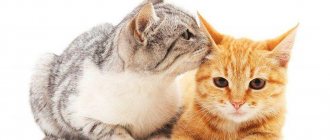Mustachioed pets often amaze with their intelligence and independence. After a long separation, some of them become demonstratively offended, pretending that they do not recognize their owners. But such behavior is difficult to attribute to forgetfulness, since many witnesses tell amazing stories of how their pets successfully covered gigantic distances in search of a home.
All these facts make us think seriously about what kind of memory cats actually have, how long it lasts and whether it is suitable for training. According to the findings, the cat family is much more amazing than you imagine.
Memory
Animals immediately forget minor information and, unlike humans, do not store in their memory what is not important for a prosperous existence.
For wild cats, which lead a predominantly solitary lifestyle, such an adaptation mechanism is of great importance. Instincts and memory. Scientists have repeatedly tried to answer the question about the capacity of a cat's memory. However, it is not possible to separate such complex mental functions as perception, memory and learning from instincts. Innate elements of behavior in mammals are inextricably linked with life experience, so it is impossible to say with certainty which actions the mustached-striped one has learned from memory and which it performs at the behest of instinct.
It would be more correct to think that with experience the polishing of genetically embedded knowledge and stable memorization of information occurs:
- hunting rituals are based on the instinct of a predator, but luck is honed through training with each new attempt;
- the algorithm for communicating with relatives is confirmed by socialization;
- caring for offspring is based on parental instinct, but with each lambing, the mother cat acquires practical skills and dexterity.
Trainers believe that cats cannot count, since no one has yet managed to put on a show with a tailed mathematician. However, the mother cat instantly detects the shortage of kittens, “comparing” the current picture with the familiar one and imprinted in memory. This “absence effect” allows cats to sense the departure of one of the family members or a change in the interior of the apartment.
Memory and sensitivity. Undoubtedly, the mental activity of cats is much poorer than that of humans, and their memory capacity is less.
It has been established that cats can retain in long-term memory and subsequently recognize only a few individuals or places. At the same time, the reliability of information storage is quite high and allows cats to perform truly fantastic actions.
For example, there are widespread cases of cats returning to their previous place of residence despite the distance. In Murmansk, they even decided to erect a monument to a local celebrity: a traveling cat named Semyon returned home from Moscow, having covered 2,000 kilometers in 6.5 years.
The most susceptible age of a kitten is considered to be from 2 to 8 weeks, when intensive formation of brain structures occurs along with body growth.
If the baby has not seen people or had contact with them during the specified period, then it will be difficult to tame him later. It is on the sensitivity of the psyche that the process of domestication of young jungle cats, ocelots and cheetahs is based.
How long does a cat remember?
How long does a cat's memory last? This period depends on the importance of the knowledge being stored. A simple example: a cat will instantly forget a guest who visited the owner’s house if he could not have any influence on the animal’s mood
But for all the remaining years, the cat will clearly remember the smell of a stranger who either greatly offended her, frightened her, or was very affectionate with her and treated her to her favorite treat.
Memory in cats, as already mentioned, is selective. The animal will remember for a long time the place where the tray is, or the sound with which the refrigerator door opens
The reason for this is simple: it considers this information important to itself.
“Time is evil for my memory...”
The first is, of course, time. The shorter the separation, the greater the chances for a cat and a person to remain “family.” Of course, a cat will not forget its owner in a week or two, if before that it lived with him under the same roof for a long time in love and harmony.
And, although there are unique people who, in a completely human way, yearn for their suddenly missing two-legged friend, look for him and call him, such a separation will not cause serious damage to the cat’s health. If, of course, the cat is left in good hands.
General information
The second part of the experiment tested long-term memory. The bowls were also demonstratively hidden, but the cats were allowed into the room only after 24 hours. The result was not so good in terms of how many cats remembered everything. Some of them ran towards the stern, still confidently. Some of the experimental subjects sniffed the shelter and looked for food. And some of the cats showed no interest in the search at all.
The conclusion from this study is simple - cats have short-term memory in the vast majority, but long-term memory is not observed in all individuals of the species. Therefore, you can judge what kind of memory a cat has over time only by looking at each individual cat.
INTERESTING: in cats, their ability to remember decreases with age in the same way as in a person or dog. The mechanisms of both long-term and short-term memory suffer.
Can a cat remember?
There is an opinion that for cats it doesn’t matter who is next to them, only comfort matters. Perhaps they don't remember the owner?
Due to their nature, cats do not show much affection, but, in fact, they know their owner. It would be more correct to say that they feel: it is unlikely that appearance plays a significant role in how cats recognize their owners. Rather, their developed sense of smell, touch and hearing allows them to do this.
Mustachioed stunt performers are the best proof of their ability to remember
Vision for felines is not the main organ of perception. They paid for their ability to see in the dark with the inability to distinguish most colors familiar to people. They only distinguish yellow-green, blue and gray shades well. Fluffy pets have difficulty distinguishing between objects closer than half a meter and static objects, although they can detect the slightest movement from 900 meters away.
Incredible facts about the memory of some cats
The most memory-trained cats are, of course, the cats of the Kuklachev Theater. Daily training produces results; cats show phenomenal talent for memorization.
INTERESTING: in general, almost any young cat can be taught tricks. The only question is to interest the animal in action. Food or hunting are the most effective elements of motivation in training, which form a stable memory for specific actions in cats.
Another case in the USA that confirms the memory cats have for their owners is the case of Tuffo the cat. Volunteers found him on the street and brought him to the clinic’s shelter. A few years later, the cat’s former owner came to the same clinic with another pet. The man at first doubted that the cat from the shelter was his cat, but then decided to bring with him a second cat, whom Tuffo knew. And a miracle happened: Tuffo, who had been lost during the move, recognized the second cat and the family took the whole group of purring friends back home.
But the English cat named Mac took much longer to find his way home. The animal got lost while the family was vacationing on the river. later, or rather after 6 years, the cat was found by volunteers, washed and treated.
And how many stories can you hear from those who moved and forgot the animal! There are a lot of such stories around the world and some of them have an incredible ending. In it, the cat always travels for several years to his owners in a new city and finds them. Whether this is true or whether people simply don’t want to believe that the cat got scared and disappeared during the move, we will never know for sure. However, in cases where cats, lost in dachas, later came along a familiar road to the city, this is quite real and there is no need to dispute the memory capabilities of cats in them.
Some interesting facts
In the UK, a cat named Mark left his house and got lost. For a long time he lived in another place, but after 6 years of travel he was able to remember the way home, in addition, he joyfully jumped into the lap of his beloved owner.
A similar incident occurred in Rostov-on-Don. A young family was moving to Lugansk for permanent residence, but for unknown reasons, their cat disappeared along the way. The neighbors' surprise knew no bounds when five weeks later they found him on the threshold of their home. Accordingly, speaking about memory in cats, it is worth noting that there are pets with special intellectual abilities.
Thus, the main characteristics of cat memory are selectivity and expediency. Cats remember only information that is important to them, which will help them successfully exist in nature or in a human home. But at the same time, cats are trainable and can remember some words and actions, thereby entertaining and delighting their owners.
Mr. Cat Recommends: Cats' Learning Ability
But cats also have genetic memory. It is guided by it that animals swim, hunt, give birth and feed their offspring. And after the kittens become independent, the female seems to forget about her purpose. Until the next birth and the next offspring.
At the same time, pets perfectly remember the daily routine of the household. They know exactly who will come and what time. And they wait for their beloved owner, sitting on the window or near the front door. The same internal mechanism causes cats to go to the bowl and ask for food at the same time.
It has been noted that if you persistently work with cats, especially from an early age, they can easily be taught certain skills and abilities. Most likely, these pets are much smarter than is commonly believed. And if they don’t know something, it’s not because they’re unable to learn something new, but precisely because they don’t want to comprehend it.
If the short-term memory of a cat was assessed in comparison with a dog, then the visual memory was compared with monkeys. And they found out that it is no worse than that of primates.
Memorization speed: how to train your pet so that he remembers everything
By their nature, cats are independent and willful; they do not have the desire to please their owner, like dogs. Therefore, they are most amenable to learning actions for which they are initially inclined.
- The most optimal age for starting training is considered to be 6-9 months, when the nervous system is formed, but habits and character are not yet there.
- You should not teach an animal several commands at once in a short time.
- Don't forget to reward them with something tasty.
- Enter commands during play, when the cat is in the best mood.
- Try not to yell at your pet so as not to lose his trust.
- There is no need to overtire your cat; five minutes a day is enough for the first “lesson”.
Out of sight, out of mind?
But it also happens differently. It seems that the cat was kindly treated by the person and even felt sad for him at first, but years later he pretends that he doesn’t know him. “Pulking!” - people think, attributing human feelings to a cat.
In fact, over the past time, another owner has taken on the role of breadwinner, drinker and protector, and the animal’s memory has erased unnecessary information about what happened before. The returning cat will take him back to his place - and after a while he will get used to him again.
Let’s make a reservation once again - these rules apply to most cats, but each case is individual. In general, when getting an animal, you need to understand the full extent of the responsibility that you take on, and try to avoid situations that can result in enormous stress for both of you. As they say, don’t part with your loved ones!
Svetlana Mosolova
Cats are mysterious creatures. If everything is clear about their internal structure, then such an abstract concept as memory raises many questions among people. Do they have such a property? What kind of memory do cats have? How does it work? How many days, months or years is it designed for? How many events and people can a cat remember? Can she forget her home and owner after a long separation?
“And I will dream about my friends’ faces...”
An even more incredible story happened with nine-year-old “old man” Karim, who in a year and eight months traveled from Uzbek Gulistan to the city of Liski in the Voronezh region!
A family moving from one country to another did not take their cat with them, because they thought that the venerable animal would not survive three days on the train. And then Karim had to follow the owners himself.
Having walked three thousand kilometers, the mustachioed man found his owner Ravilya at the market, where she got a job. And, having arrived at the new house, as if nothing had happened, he lay down in the chair on which he had slept back in Uzbekistan. And the cat was not looking for a place, as often happens, but for people!
Of course, in such unusual cases, cats, in addition to memory, are also helped by the ability to perfectly navigate in space. How they do this is as much a mystery as the seasonal migrations of birds. There are many versions, but none of them have yet received accurate scientific confirmation.
But, be that as it may, there is no doubt about the cat’s memory, and it lasts as long as the cat’s affection lasts.
Svetlana Mosolova
What canned food tastes best for cats?
RESEARCH ATTENTION! You and your cat can take part in it! If you live in Moscow or the Moscow region and are ready to regularly observe how and how much your cat eats, and also remember to write it all down, you will receive FREE SET OF WET FOOD.
Project for 3–4 months. Organizer - Petkorm LLC.
Want to participate? Call!
“The years passed. The storm is a rebellious gust..."
But will the cat remember the person in a year? Here it all depends on how big a role your pet has assigned to you in his life.
Cats' memory for people is selective and records only what is vital for the animal - both with a plus and a minus sign.
For example, the owners of one mustachioed dog, who had undergone some very unpleasant procedures at the veterinary clinic, a year later invited Aibolit, who treated the pet, to their home. Over the past period of time, the doctor and the patient have never seen each other. And it was very funny for everyone to watch how, upon seeing the “offender,” the cat, on its belly, tried to quietly leave the corridor where, according to tradition, it had gone out to greet the guest.
And another cat, fed from a nipple by a teenage boy, immediately recognized his savior in the brave soldier who had returned from the army. The cat's joy, they say, knew no bounds, although two years have passed since the separation.
Does memory help learning?
Observation and experience allow cats to learn everything they need to live a comfortable life. With the help of memory, they choose what will be useful and what allows them to react in the most appropriate way the next time the same situation occurs. Memory works both at home and in nature, since from childhood they watch their mother to find out everything they need.
This system allows the cat to remain safe while at the same time identifying familiar people and remembering all the positive things associated with them; such as delicious food, affection, and hours of play! What a cat learns is directly related to the benefits they can derive from that learning.
We invite you to read: Acne on the chin of cats: treatment, how to treat, photos
If they find that it doesn't suit them, it will likely be resolved by their short-term memory. This is why it is so difficult in most homes to prevent them from scratching in certain areas. Although you can train your pet to use a scratching post, it is not always possible to train them.
Features of memory in cats and kittens
A cat's brain is much smaller than a human's - its weight is only 1% of body weight, while a person's is 2%. But at the same time, it is similar to our brain: it also consists of neurons that form gray and white matter, is divided into frontal, temporal, parietal and occipital lobes, and the cortex is covered with convolutions, although more primitive than those of humans.
The cat's brain has a similar structure to the human brain, and the same parts of it are responsible for emotions and memory.
Scientists have long been interested in the peculiarities of cat memory. Back in the 70s of the last century, experiments were conducted on this topic. Hungry cats were shown food, then bowls were hidden in front of them under different boxes and the subjects were removed from the room. After half an hour, the cats were returned and their behavior was observed. Almost all the cats immediately ran to the right boxes and found bowls of food underneath them. However, when the experiment was extended to a day, the situation changed. During the day, the cats clearly forgot the details of the situation. Some of them showed no interest in the boxes at all, while others sniffed all the boxes in a row. That is, some cats retained memories, but they were vague.
Cats are especially good at remembering anything related to food, as this topic is vital in the wild.
A more recent experiment appears in the journal Behavioral Processes. Japanese scientists studied episodic memory in cats. This is a memory that is associated with certain events and situations. In the first part of the experiment, cats were asked to examine four bowls of food, but were only allowed to try from two bowls. Then the cats were taken out of the room for a quarter of an hour, after which they were returned, replacing all the bowls with the same empty ones, but maintaining their location. The animals were more attracted to those bowls from which they had not yet eaten. And they clearly remembered their location. In the second part of the experiment, the conditions became more complicated. Only two of the four bowls contained tasty food, one contained an inedible item, and the fourth bowl was empty. The cats were allowed to explore all the bowls and eat food from one, then they were removed from the room and returned after a while. The subjects showed interest primarily in the second remaining bowl of food, that is, they remembered the circumstances of the situation. As a result, scientists concluded that cats have episodic memory, and in the first part of the experiment, the cats remembered where the food was, and in the second, what exactly was in different places.
Without a good memory, cats would not be able to manipulate human objects, such as front doors and furniture doors.
Thus, the development of short-term and episodic memory in cats has been confirmed experimentally. And in fact, how would cats learn and master new forms of behavior without a good memory? But cats can even be trained. Proof of this are the performances of the famous Kuklachev Theater. And at home, you can teach your cat to understand certain words and follow commands: cat owners often share similar experiences on the Internet.
Many cats are excellent at carrying human objects in their teeth and can be trained to bring a newspaper or slippers to their owner.
However, a cat's memory has its own characteristics.
Cats remember best what is important to them or is colored with vivid emotions. This property of memory can be called selectivity.
Only information necessary for the safe existence of cats is remembered. In the wild, memory helps cats change their behavior in time, adapting to the situation, and survive. Therefore, they perfectly remember places where there is food or water, warm shelter, enemies or dangerous objects, but they immediately forget minor information. Memories arise involuntarily, by association with a certain picture, sounds, smells, tactile sensations, and cats cannot retrieve information from memory voluntarily, like humans.
Longevity: how long do cats remember certain events and their owner?
As a result of the experiments, scientists approximately determined the time during which cats retain memories - about 16 hours. This is a characteristic of their short-term memory. But cats only remember information that is important to them so well. For example, a cat will remember well a guest who accidentally stepped on his tail or fed the cat a tasty treat. He will forget guests who did not have direct contact with him in a few minutes.
How much information does a cat have in his head?
Scientists wondered how much information a cat's memory can hold. But this could not be established for certain. The line between memorization and instincts is not clear. Despite the fact that in general the memory capacity of cats is less than that of humans, they can retain a lot of information. Having thrown away everything unnecessary and leaving the main thing, they store all the knowledge they need for life.
Interesting information was published by Behavioral Processes. It has been reported that four-legged pets have episodic memory, contrary to the belief that only humans have it. What opportunities does this give the cat? It turned out that the animal is able to remember past events if it encounters them again.
This was discovered during experiments by Japanese scientists with bowls of food. The animals remembered which ones contained edible food and which ones contained inedible objects, and subsequently, the first thing they did was explore those containers from which they managed to eat the previous time. Several different tests were carried out on dozens of animals, and each of them confirmed the cat’s ability to remember the circumstances in which it found itself in a previous situation. It became clear that cats not only remember where food is, but also what to explore first to find food.
An orientation experiment was carried out by scientists from Germany. First, they gathered a group of cats from one city, took them some distance from their home and checked whether the pets could return home. All animals coped successfully. Then the task became more complicated. The cats were launched into a large labyrinth, covered from above. The building had 24 exits to different directions of the world. 98% of animals chose the exit that was located in the direction of their home.
The capabilities of cats are much wider than one might imagine. They use memory, instincts, and the ability to navigate, which sometimes leads to surprising situations.
Duration of information storage
Experiments with cats and other animals made it possible to identify 2 types of memory in them:
Short-term. This mental function allows you to perceive any events, but retains information for only a short time (no more than 27 seconds). If the event is not repeated, then the “record” loses its relevance and is erased under the influence of a new piece of information - this is how the brain protects itself from overload and “cleanses itself.”
Long-term. The long-term “imprint” of events is very selective, but resistant to influences that destroy short-term memory
This mechanism records a single phenomenon or incident that is of increased importance for an individual and stores it for a long time. This is why long-term memory in animals is called “specialized memory.”
How good is a cat's memory?
There is no study yet that determines the maximum number of memories a cat can retain. What is certain is that they can not only remember situations that may be favorable or unfavorable for them, but also know whether to repeat them or not, and how to react to them.
Thanks to spatial memory, a cat can easily learn the location of objects in the house, especially those that interest them most; such as their bed, bowls and sandbox
Notice what they do when you add a piece of furniture that wasn't there before!. Are you surprised when your cat jumps into bed minutes before you do? A few days spent with you is enough to remember all your standard actions.
So, they know when you leave, what time you get up, and much more!
Are you surprised when your cat jumps into bed minutes before you do? A few days spent with you is enough to remember all your standard actions. So, they know when you leave, what time you get up, and much more!
Cat's brain: faster than an iPhone, more complex than a dog
Theory ALL ARTICLES 27171
Photo: Sergey Vladimirov / CC
We have already written about some of the features of cat intelligence and how cat people are smarter than dog people. Let's figure out what features of the brain structure and memory function of cats distinguish them from us and from other animals!
Size is not critical.
The weight of a cat's brain is 0.9% of its body weight. For comparison, the mass of the human brain is 2% of the mass of his body, and in dogs it is on average 1.2% (however, unlike cats and people, dogs come in very different sizes). However, brain size is not directly related to intelligence level. Most often they are caused by purely physiological limitations - for example, head size. If our heads “grew” following the increase in the cerebral cortex, then at one “wonderful” moment we would simply stop being born naturally, since the size of the birth canal is also limited. Our brains will never get bigger than they are now, and the same can be said about the brains of cats or dogs. But:
The brain structure of a cat is more complex than that of a dog.
Higher nervous activity is the ability to think and make rational decisions. The cerebral cortex is responsible for higher nervous activity. The human cerebral cortex consists of more than 10 billion nerve cells. In the cerebral cortex of a cat there are 300 million nerve cells, and in a dog - what a shame - only 160 million.
Cats have better short-term memory than dogs.
It has been experimentally established that the memory of where treats are “stuck” is retained in cats for 16 hours. And dogs forget this place after 5 minutes.
Photo: Sergey Vladimirov / CC
With long-term memory everything is more complicated...
It is believed that not much information is stored in cats' long-term memory. It has been established that cats can remember certain places and certain people for many years, but, by and large, scientists still do not know how long-term memory works in cats or dogs. However, the cerebral cortex is responsible for long-term memory, and in cats it is almost 2 times more complex than in dogs (see paragraph No. 2). It is quite possible that cats’ long-term memory works better.
The cat learns by watching you.
The cat does not need to be taught how to open the refrigerator. She just needs to see you do it a few times and she will learn on her own. This is how they work: kittens learn by watching their mother - how she hunts, eats, licks herself... And then they try to repeat after her - until they learn to do everything correctly.
Photo: hehaden/CC
As cats age, brain function declines.
Older cats may develop a disease similar to Alzheimer's disease. Feline cognitive dysfunction syndrome is associated with the aging of the brain and can lead to symptoms such as depression, spatial disorientation, and inappropriate behavior. Everything is the same as in humans, but, fortunately, not all people and not all cats are susceptible to this disease.
A cat is smarter than an iPhone.
With each new generation, our smartphones and tablets become more powerful and faster. But they are still very far from cats! For example, the internal memory of an iPhone does not exceed 64 gigabytes. And a cat’s long-term memory can contain up to 91,000 gigabytes of information! At what speed do computers and cats process information? The iPhone processor produces about 170 million computational operations per second. And the cat’s brain performs 6 trillion operations during the same time! 6 trillion is 6000000000000, or six million million.
Thinking, consciousness and self-awareness of a cat (part 12)
So, do cats think? Of course, they cannot think in our human understanding of the word, but they have access to mental processing of information entering the brain, on the basis of which they make decisions about their further actions.
They have internal representations of the material world around them, they perceive certain physical laws (for example, that objects do not cease to exist when they are not visible to the eye), they have a good sense of time, they can identify other cats, some people and a number of items.
Intelligence is defined by people and judged by human abilities. Children are taught to look where the finger is pointing. As for cats, if you point at an object, the cat will look at your finger, and not where it is pointing.
To attract your cat's attention to an object, you need to touch the object itself.
One of the parameters of intellectual development is self-awareness. A popular test for self-awareness is to observe how an object (human or animal) reacts to its reflection in a mirror. Humans and great apes recognize themselves in him. If you smear paint on a child's nose or a chimpanzee's face and let them look in the mirror, both the child and the monkey will try to wipe the stain off their face rather than the mirror.
If a mirror is placed in front of a cat, then at first it looks for an unfamiliar animal hiding behind the mirror, but soon realizes that the cat in the mirror is not real and ignores it. (Such ignoring is necessary, otherwise the cat would not be able to drink water after seeing its reflection in it). Unlike people and great apes, a cat does not understand that the reflection in the mirror is itself.
Cat behavior researcher Sacha Scofield has a different take on the definition of self-awareness in cats. She suggests that the mirror test is not applicable to cats, since it does not provide an objective assessment of the way of thinking of non-social subjects, which includes cats.
The hypothesis is that the cat loses interest in the reflection in the mirror because it perceives it as another cat that is not trying to interact with the first one. Secha believes that the cat perceives the image in the mirror as a reflection of the real world and uses it to observe objects that are out of sight.
The researcher observed how her own cats sometimes looked at each other or watched their owner while looking in the mirror. Sometimes the cat, meeting its eyes with the owner’s reflection, began to meow in greeting, showing that it recognized the image.
Do cats remember?
Even in the last century, zoologists conducted experiments to clarify the question of what kind of memory cats have, and whether they have developed short-term and long-term memory. Hungry animals were shown their favorite food. Then, in front of their eyes, food was hidden under one of the overturned boxes, after which the cats were taken out of the room.
The essence of the actions was the same, only the animals were taken out of the premises for a day. The results have changed. Some cats simply forgot about the hidden food and did not try to look for it, while others sniffed all the boxes, trying to figure out where the smell of the treat was coming from. That is, they did not remember which drawer the food was under. So, long-term memory in these animals is less developed than short-term memory.
What else are the features of this mental process? It has been proven that it is selective in pets. You and I can remember a huge amount of information from different areas of life, past events, images, sounds, names. Much of the above does not play any role in a person’s life.
But cats remember what is important to them
The more important an object, circumstance, or event is for them, the easier they will remember it. For example, a stray animal will constantly return to the house or cafe where it was fed once
After all, this event is extremely important for the cat. An experienced mother cat cares for kittens in the second or third litter more carefully, because she remembers how she raised the cubs in previous times.
And this is another proof that these animals have long-term memory. But it also has its own time frame. After all, when the offspring grows up and they are distributed, then after a certain period of time, if the mother cat meets one of the cubs, then she simply does not recognize him, because she does not remember.
In the early 1970s, zoologists conducted a simple experiment to find out which memory is better developed in cats: short-term or long-term. Hungry cats were shown their favorite food, hidden in front of the animals under one of the overturned boxes, and then the cats were taken out of the room for half an hour.
The second part of the experiment was carried out under the same conditions, but the cats were taken out of the room for a day. Now the results have changed: some cats did not even try to look for food, others sniffed the boxes (that is, they remembered that there was food somewhere, but did not remember where). It would seem obvious that long-term memory in cats is less developed, but not everything is so simple.
How does a cat's brain work?
Looking at your cat lying next to you, have you ever wondered what is going on in your pet's head right now?
Researchers are calling our time the “golden age of canine cognition,” as laboratories around the world are set up to study the brains and intelligence of man’s best friend. Unfortunately, things are more complicated with cats, and the brain function of these pets is not so easy to study. Wayward animals often refuse to “cooperate” and cannot be used for objective and large-scale research. However, despite the difficulties, today it is already possible to draw conclusions about how exactly the cat’s brain works and what affects its activity.
The cat's brain is a complex organ responsible for processing information received from the body and controlling movements. Anatomically speaking, it is similar to the brain of any other mammal and is made up of millions of neurons connected to other cells. The cat's brain consumes 20% of the blood pumped by the heart, and by weight is equal to approximately 1% of body weight. However, to assess an animal's intelligence, it is not the size of the organ itself that is important, but its structure. By the way, it is 90% identical to the human one.
The cerebral cortex is designed primarily to perceive information received from the auditory organs. This is extremely important for a cat, which is a hunter by nature. The interaction of the organs of smell, touch and vision with the pet’s brain also occurs through the cortex. The gray matter of a cat's brain is responsible for such seemingly simple but vital actions as heartbeat, yawning and blinking. The cerebellum is a kind of “engine” of your pet: thanks to it, the animal walks, runs, jumps and maintains balance. The hemispheres of the brain, which the brainstem connects to the central nervous system, are responsible for the cat’s ability to acquire and apply new knowledge, experience a wide range of emotions and demonstrate certain behaviors.
Hormones produced by the cat's brain regulate most of the pet's body functions. For example, oxytocin (stimulates the process of labor) and antidiuretic hormone (regulates urine concentration) are produced by the hypothalamus, and growth hormones and melatonin (involved in the regulation of sleep and wakefulness) are produced by the pituitary gland.
There are 300 million neurons in the cat's cerebral cortex, compared to, for example, 160 million in dogs. What can a pet do thanks to such an “arsenal”?
The cerebral cortex not only controls the higher functions of rational thinking, but is also responsible for solving assigned problems. In addition, it is a kind of storage place for short-term and long-term memory. Research has shown that cats' ability to remember and use information for short periods of time (called primary or short-term memory) lasts about a minute and declines rapidly after just 10 seconds. However, long-term memory in pets is much more seriously developed and can only be impaired due to age-related changes or illness. Cats learn by watching and doing: opening doors, responding to the sound of a bell, pressing switches. According to scientists, these skills and the memories associated with them exist in the minds of pets for 10 years or more. The cat's memory of an event or place is associated with the emotions they experienced in the given circumstances.
If an object slips out of sight, for example, is hidden behind another thing or placed in a drawer, we know that it has not ceased to exist. This concept, called “object permanence,” seems quite simple to adults, but not all animals (or even small children) understand it. Cats, on the other hand, are able to hold a disappeared object in their minds and reason about where it might be. Try hiding a toy or treat in a closet when your pet is present. Most likely, the cat will sit nearby and wait for the object to appear again: she knows that it has not ceased to exist. This ability is very important for a hunting cat, because if the prey is hidden or simply disappeared around the corner, this is not a reason to stop the pursuit.
The complex structure of the cat's brain determines several other abilities of our pets. Cats have a sense of time. Pets know very well exactly when they will be fed, and they always begin to ask the owner for food “on schedule.” Another example: when you return home after work, the cat (if it had such a habit to begin with) will greet you in the hallway. However, if you break your usual schedule and arrive much earlier, your pet may hesitate and not come out to meet you. Additionally, cats are apparently able to differentiate between larger amounts of something and smaller ones. Scientists have noticed that animals easily distinguish a group of two objects from a group of three, etc.
In conclusion, it should be noted that intense brain activity helps cats understand what exactly their owner wants from them. This often happens through “reading” gestures. So, if you put two bowls in front of your pet, one empty and the other filled with food, but do it in such a way that the cat does not see the contents of either of them and does not smell anything, it should be difficult for the pet to find food. However, your furry friend will cope with this task “excellently” if you gesture to him in the direction of the correct bowl. This suggests that the cat has what scientists call “theory of mind,” that is, the ability to attribute knowledge, desires and intentions to another being, in this case a person.
How many events and people can a cat remember?
Scientists have no doubts about how long information is stored in the cat’s brain. It depends on its significance. Animals quickly forget the smell of a guest who did not show them attention and did not arouse their interest. At the same time, they keep in the memories for a long time the people who caused them trouble (they stepped on their tail, shouted, hit).
Zoologists have not been able to determine the volume of a cat's memory. They cannot answer the question of how many events and people the brains of these animals can contain. Numerous studies have not given a definite result, because in most cases it was not possible to find out whether they act instinctively or from memory.
One thing scientists can say for sure: felines' memory is significantly inferior to humans in volume. This is confirmed by the size of the cats' brains. In humans, it stores a lot of information that is even of little significance. A cat's brain filters incoming information, retaining only the most significant.
Learning ability
A caring owner is concerned not only with the question of what kind of memory cats have, but also whether it can be trained in order to increase the mental abilities of the pet. As zoologists assure, this is not necessary, since the kitten is taught all the necessary skills by its mother. When living together with an adult in the same house, he will observe and learn from her. If the kitten was weaned from its mother early, it will still learn the skills necessary for life, but at the level of its own instincts. If a person still needs to influence this natural process, then this can be done in several ways.
- Add more vitamins to your pet's diet.
- In addition to food, give natural products, in particular fish and meat.
- Carry out training on your own, for example, moving a bowl or bed to a new place, and then check how quickly the individual gets used to the new conditions.
- You can let the kitten out for a walk and see if he finds his way home on his own, but at this time you need to carefully monitor him so that he does not get lost.
According to zoologists, the optimal age of an animal for memory development is 2–5 years.
Two types of memory
Many experiments have been carried out on cats in laboratory and real conditions, allowing one to evaluate the mental abilities of an individual. During their conduct, it was revealed that she has two types of memory.
- Short-term memory, which lasts no more than 16 hours. During this time, the cat may find food that it recently hid or a toy.
- Long-term memory that lasts a lifetime. For example, an individual remembers its previous owners for a long time, and if it gets lost, then there is a high probability that it will still find its way home.
It is worth noting that cats, just like all living creatures, are characterized by age-related changes. This means that young pets absorb information much better and retain it longer than older cats.
Does the cat remember what happened to it many years ago?
Cat old age: what to change in the conditions of detention
Cats are very good at remembering past events if they aroused strong emotions in them. For example, a cat that was thrown into the bushes by its ruthless owners right in its carrier will be terribly afraid of carriers and all closed spaces all its life, because it received truly unforgettable emotions during its stay in it.
There is also the so-called memory of ancestors, when a cat, no matter how domesticated it is, will always hunt birds and mice that come into its field of vision. This is due to the special instinct of the hunter, which is inherent in every cat by nature and is unlikely to ever be eradicated.
Learning ability
Learning is inextricably linked with memory and is based on the adaptive mechanism of acquiring and assimilating information. In everyday life, domestic cats remember the algorithm of actions and marker words if they are repeated a certain number of times and lead to the same result. So, at the word “eat”, the cat runs into the kitchen with a purr and takes a position near the bowl. The sight of a familiar box of food or the rustling sound of a treat inside has a similar effect.
It is much easier to develop skills in young cats (up to 3 years of age), and most often pets learn passively, simply by watching how a person opens a door or from which shelf they take out a treat. This is how kittens learn the behavioral elements of adult life from their mother.
Recipes for success.
The minimum number of repetitions required to transfer information about an event of little significance to a cat into long-term memory is 5.
You can achieve results in training by instilling a consistent interest in activities and based on the cats’ innate craving for hunting, playing and getting food.
When performing tricks, the individual talents of the animal are of great importance: for example, the tendency to carry various objects in its teeth or boldly overcome obstacles. Even a minor result should be positively reinforced, forming an increasingly stable connection between neurons. In turn, any negative influence is ineffective in training cats, causing fear and rejection of humans.
Freedom-loving cats still keep many unsolved mysteries, charming and delighting their owners every day.
Time and memory
So how long does a cat's memory last? It all depends on how important the stored information is for our pets. For example, a cat will quickly forget the smell of a random guest if it did not affect its mood in any way, but will remember the owner’s smell for the rest of its life if a person treats the cat properly or, conversely, physically punishes, scares or angers it
Cats remember the sound of the refrigerator being opened and the place where the tray is for a long time, if not for life, because it is important to them. But remembering what clothes the hostess was wearing at the time of the first meeting is pointless and does not bring any benefit.
Is it possible to develop a cat's memory?
It is possible to develop a cat’s memory, but, firstly, the result will depend on the individual abilities of the animal, and secondly, the emphasis will need to be placed not on special techniques and exercises, but on increasing the cat’s interest in activities. The pet will easily remember what interests him: usually this is related to hunting, playing or food. Any success should be positively reinforced with praise or a treat. This is exactly how Yuri Kuklachev trains his artists.
Kuklachev says that any cat has its own special talent and if a person identifies it, then training the pet in this area will be quick and easy










